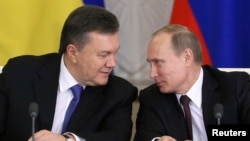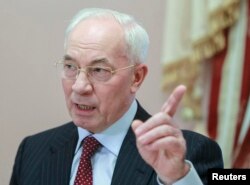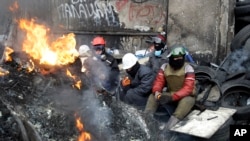MOSCOW/KYIV —
Russian President Vladimir Putin ordered his government on Wednesday to honor a $15 billion bailout deal for Ukraine, but a minister suggested the make-up of a new government in Kyiv will determine how quickly the vital aid is dispatched.
In Kyiv, Ukraine's new interim prime minister promised to try to limit the economic damage inflicted by more than two months of turmoil, and said he expected Russia to disburse a further $2 billion aid installment “very soon”.
Moscow, however, sent mixed messages on how soon the money which Ukraine urgently needs would arrive.
Putin repeated a promise he made on Tuesday to provide the aid even if the opposition forms the next government in Kyiv. “I would ask the government to fulfill all our financial agreements in full,” he said, according to Interfax news agency.
However, his Economy Minister Alexei Ulyukayev cast doubt on the timing of the installment. “Our commitment to fulfilling these obligations has been confirmed. As for the schedule and parameters, this is an issue that requires further discussion with our Ukrainian colleagues and consideration of the restructuring of the government,” Interfax quoted him as saying.
Putin agreed the aid package with Ukraine in December, throwing the ex-Soviet state a lifeline in what the opposition and the West regard as a reward for scrapping plans to sign political and trade deals with the European Union and promising to improve ties with Russia.
Ukraine has been gripped by mass unrest since President Viktor Yanukovich walked away from the EU deals last November.
Prime Minister Mykola Azarov resigned on Tuesday in an attempt to appease the protesters and the opposition, and though his deputy has taken over as acting prime minister it is unclear when a new government will be formed.
Leonid Kravchuk, the first president of independent Ukraine, stressed the depth of the crisis on Wednesday.
“The state is on the brink of civil war. We must call what is happening by its proper name. What is happening is revolution because we are talking about an attempt to bring about a change of power,” he told parliament.
With Yanukovich and loyalist deputies in parliament now making concessions to defuse the crisis and with Azarov, a Russian-born hardliner, gone there had been speculation that Moscow might slow or even halt the stream of aid.
But acting prime minister Serhiy Arbuzov appeared to have been cheered by Putin's promise on Tuesday to extend the $15 billion in credits and cheaper gas.
“We have already received the first tranche of $3 billion and expect to receive the second tranche of $2 billion very soon,” he said, chairing his first cabinet meeting. Russian is offering the funds by buying Ukrainian government bonds.
Back-room talks
In Kyiv opposition deputies and Yanukovich loyalists were in back-room talks on Wednesday over the wording of a draft law under which protesters detained so far by police would get amnesties.
Though the unrest began because of Yanukovich's U-turn on policy towards Europe, it has since turned into a mass demonstration, punctuated by violent clashes between radical protesters and police, against perceived misrule and corruption under Yanukovich's leadership.
Several hundred people camp round-the-clock on Kyiv's Independence Square and along an adjoining thoroughfare, while more radical activists confront police lines at Dynamo football stadium less than half a kilometer away.
Anti-Yanukovich activists have also stormed into municipal buildings in many other cities across the sprawling country of 46 million. Hundreds of protesters in Kyiv have occupied City Hall and the main agricultural ministry building.
Opposition leaders, including boxer-turned-politician Vitaly Klitschko, were resisting demands by Yanukovich's Regions Party for barricades to be removed from roads and for protesters to leave occupied buildings as a pre-condition for an amnesty for detained activists.
Klitschko, in a comment which also highlighted the tenuous control the opposition leaders have over sections of the protest movement, said: “For us to simply say to people 'you have done your job, now go home' is now not possible.”
In a big concession to the opposition and the protest movement, pro-Yanukovich deputies voted on Tuesday to repeal a series of sweeping anti-protest laws which they brought in hastily on Jan. 16 in response to increasingly violent clashes.
But opposition leaders, who also include former economy minister Arseny Yatsenyuk and nationalist Oleh Tyahnibok, have won a mandate from protesters on the streets to continue to press for further gains from Yanukovich.
Previous constitution
The opposition also wants a return to the previous constitution which would represent another significant concession since it would reduce Yanukovich's powers.
Speculation that Russia might cut the financial lifeline it has offered prompted the Standard & Poors agency to cut Ukraine's credit rating to CCC+ on Tuesday.
Arbuzov said the central bank was ensuring stability on the financial markets and he made no mention of any changes to his predecessor's policy of keeping the hryvnia currency pegged close to the dollar and maintaining subsidies for domestic gas - both criticized by the International Monetary Fund.
The tense situation and talk by some of Yanukovich ministers of a possible state of emergency being declared has caused alarm in the West and Western governments have urged Yanukovich to take all measures to ease the situation.
The EU's foreign policy chief, Catherine Ashton, was in Kyiv on Wednesday and scheduled to meet Yanukovich and opposition leaders.
U.S. Vice President Joe Biden, in a telephone conversation with Yanukovich on Tuesday night, welcomed concessions made so far and encouraged him to look for more ways to compromise with the opposition, the White House said.
In Kyiv, Ukraine's new interim prime minister promised to try to limit the economic damage inflicted by more than two months of turmoil, and said he expected Russia to disburse a further $2 billion aid installment “very soon”.
Moscow, however, sent mixed messages on how soon the money which Ukraine urgently needs would arrive.
Putin repeated a promise he made on Tuesday to provide the aid even if the opposition forms the next government in Kyiv. “I would ask the government to fulfill all our financial agreements in full,” he said, according to Interfax news agency.
However, his Economy Minister Alexei Ulyukayev cast doubt on the timing of the installment. “Our commitment to fulfilling these obligations has been confirmed. As for the schedule and parameters, this is an issue that requires further discussion with our Ukrainian colleagues and consideration of the restructuring of the government,” Interfax quoted him as saying.
Putin agreed the aid package with Ukraine in December, throwing the ex-Soviet state a lifeline in what the opposition and the West regard as a reward for scrapping plans to sign political and trade deals with the European Union and promising to improve ties with Russia.
Ukraine has been gripped by mass unrest since President Viktor Yanukovich walked away from the EU deals last November.
Prime Minister Mykola Azarov resigned on Tuesday in an attempt to appease the protesters and the opposition, and though his deputy has taken over as acting prime minister it is unclear when a new government will be formed.
Leonid Kravchuk, the first president of independent Ukraine, stressed the depth of the crisis on Wednesday.
“The state is on the brink of civil war. We must call what is happening by its proper name. What is happening is revolution because we are talking about an attempt to bring about a change of power,” he told parliament.
With Yanukovich and loyalist deputies in parliament now making concessions to defuse the crisis and with Azarov, a Russian-born hardliner, gone there had been speculation that Moscow might slow or even halt the stream of aid.
But acting prime minister Serhiy Arbuzov appeared to have been cheered by Putin's promise on Tuesday to extend the $15 billion in credits and cheaper gas.
“We have already received the first tranche of $3 billion and expect to receive the second tranche of $2 billion very soon,” he said, chairing his first cabinet meeting. Russian is offering the funds by buying Ukrainian government bonds.
Back-room talks
In Kyiv opposition deputies and Yanukovich loyalists were in back-room talks on Wednesday over the wording of a draft law under which protesters detained so far by police would get amnesties.
Though the unrest began because of Yanukovich's U-turn on policy towards Europe, it has since turned into a mass demonstration, punctuated by violent clashes between radical protesters and police, against perceived misrule and corruption under Yanukovich's leadership.
Several hundred people camp round-the-clock on Kyiv's Independence Square and along an adjoining thoroughfare, while more radical activists confront police lines at Dynamo football stadium less than half a kilometer away.
Anti-Yanukovich activists have also stormed into municipal buildings in many other cities across the sprawling country of 46 million. Hundreds of protesters in Kyiv have occupied City Hall and the main agricultural ministry building.
Opposition leaders, including boxer-turned-politician Vitaly Klitschko, were resisting demands by Yanukovich's Regions Party for barricades to be removed from roads and for protesters to leave occupied buildings as a pre-condition for an amnesty for detained activists.
Klitschko, in a comment which also highlighted the tenuous control the opposition leaders have over sections of the protest movement, said: “For us to simply say to people 'you have done your job, now go home' is now not possible.”
In a big concession to the opposition and the protest movement, pro-Yanukovich deputies voted on Tuesday to repeal a series of sweeping anti-protest laws which they brought in hastily on Jan. 16 in response to increasingly violent clashes.
But opposition leaders, who also include former economy minister Arseny Yatsenyuk and nationalist Oleh Tyahnibok, have won a mandate from protesters on the streets to continue to press for further gains from Yanukovich.
Previous constitution
The opposition also wants a return to the previous constitution which would represent another significant concession since it would reduce Yanukovich's powers.
Speculation that Russia might cut the financial lifeline it has offered prompted the Standard & Poors agency to cut Ukraine's credit rating to CCC+ on Tuesday.
Arbuzov said the central bank was ensuring stability on the financial markets and he made no mention of any changes to his predecessor's policy of keeping the hryvnia currency pegged close to the dollar and maintaining subsidies for domestic gas - both criticized by the International Monetary Fund.
The tense situation and talk by some of Yanukovich ministers of a possible state of emergency being declared has caused alarm in the West and Western governments have urged Yanukovich to take all measures to ease the situation.
The EU's foreign policy chief, Catherine Ashton, was in Kyiv on Wednesday and scheduled to meet Yanukovich and opposition leaders.
U.S. Vice President Joe Biden, in a telephone conversation with Yanukovich on Tuesday night, welcomed concessions made so far and encouraged him to look for more ways to compromise with the opposition, the White House said.







